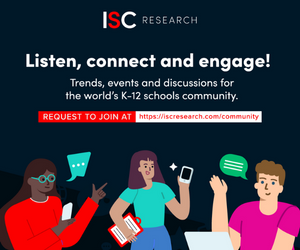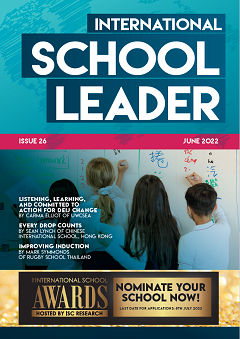By Helen Kelly
While the wellbeing of students and staff has climbed the agenda since the pandemic, the wellbeing of school leaders is still a low priority. This is short-sighted as research shows the quality of headteacher and principal wellbeing can have a significant impact on school effectiveness. Over recent decades, senior leaders globally have experienced increasing workloads, longer working hours and a faster working pace, while their work is becoming more cognitively and emotionally demanding. Leaders are also struggling to effectively recover from these increased work demands in their non-work time. It is no surprise then that studies show most school leaders to be overwhelmed and experiencing burnout at a rate almost double that of employees generally.
The burnout continuum
Burnout is an occupational condition recognised by the World Health Organization as comprising three dimensions: exhaustion, detachment/cynicism and ineffectiveness. While most leaders do not burn out, it is important to understand that burnout is a continuum upon which all employees lie. At one end is engagement, where an individual experiences low levels of exhaustion and detachment/cynicism and high levels of effectiveness, and at the other end is burnout. In between, there are three other profiles that individuals may experience on the way to burnout: overextended, disengaged and ineffective. School leaders will move up and down this continuum during their career, depending on the demands of their role and their capacity to manage those demands.
The unique demands facing international school leaders
From a decade of research, I have learned that similar factors are likely to move a leader along the continuum towards burnout, regardless of where they work – the most common being unmanageable workloads, challenging adult relationships and poor support. International school leaders, however, experience a unique set of demands that may impact their wellbeing.
Leading an international school can be a very intense experience and the responsibilities placed on head teachers and principals often go well beyond what leaders encounter in a domestic setting. Each school has its own set of complex, contextual factors that need to be navigated, often with little support and no safety net. The emotional demands of attending to the needs of a culturally diverse and often highly transient community, in whose lives the school is a major focal point, are considerable. Adult relationships with staff, parents and governance can be highly challenging and a source of significant stress, while the loneliness of leaders, living away from their social support network, brings additional strain.
In my 2017 study into the emotional demands of leading an international school, 97% of participants said they found their work to be emotionally challenging. Almost half of leaders found this impacted negatively on their work, while 50% felt it impacted negatively on their health and 47% said there had been times when they had felt close to breaking point.
The pandemic only served to intensify the demands placed on international school leaders. My 2020–2021 research found head teachers and principals across the globe to be under enormous strain. In 2023, the ongoing fallout of the crisis continues to impact schools and is having a significant effect on the wellbeing of their leaders.
“The emotional demands of attending to the needs of a culturally diverse, often highly transient community are considerable.”
Avoiding burnout and sustaining effective leadership
So, what can leaders do to avoid burnout and sustain effective leadership for the period of their whole career? First, it is important to understand that burnout is primarily a contextual condition and not a problem of the individual. The key to avoiding burnout, therefore, is not better self-care by leaders; the most effective way to prevent leaders from moving along the burnout continuum is to understand the school-based factors affecting them and to take steps to create a working environment where all leaders can flourish. In my book School Leaders Matter: Preventing Burnout, Managing Stress, and Improving Wellbeing, I set out a strategic framework to facilitate this process.
While the effectiveness of self-care is limited without accompanying work-related changes, there are things that leaders can do to recover more effectively from the demands of their work. Research shows there are four work recovery experiences that leaders should be engaging in regularly and frequently during their non-work time: psychological detachment from work; relaxation; control over how they spend their non-work time; and mastery experiences, where an individual enjoys a sense of achievement from activities that are not work-related.
The importance of switching off from work
Studies show that school leaders identify the inability to detach or switch off as a major factor affecting their management of work-related stress. Long working hours, including work during evenings, weekends and holidays, and 24/7 availability by smartphone reduce essential opportunities to detach. The emotional nature of the school leader’s work can also cause excessive rumination over interactions that have occurred during the working day.
I would argue that after improving sleep, finding ways to switch off is the single most important act of self-care leaders can engage in. This requires individuals to set clearer home–work boundaries. Research shows that employees who prefer to separate home and work (ie, ‘separators’) have much higher levels of wellbeing than ‘integrators’, who prefer to combine work and home. Setting clearer boundaries may involve simple, practical steps such as creating pre- and post-work rituals to help demarcate work and non-work time, switching off or locking away devices, or making school-wide commitments about out-of-hours communication.
My extensive experience working with international school leaders has taught me, however, that the act of switching off is more complex for many. It can involve the need to address feelings of guilt, separate personal from professional identity, and reflect on other factors driving excessive work tendencies such as imposter syndrome, perfectionism or people pleasing, which can lead to unhealthy self-sabotage behaviours.
The need to switch off frequently and regularly
It is common for international school leaders to abnegate their own needs during the school term and push on through to the holidays, when work recovery can begin in earnest. Studies show very clearly, however, that the benefits of a holiday only last for two to three weeks on return to work, while the effect of a relaxing weekend only lasts until Tuesday. It is, therefore, essential that leaders create opportunities to switch off regularly and frequently, with at least one full non-work day every weekend and at least two to three ‘switched off’ evenings per week. While it may sound unrealistic for most leaders, studies also show the wellbeing benefits of detaching during the working day.
While most leaders cannot take lengthy breaks during the school day, multiple microbreaks of only 40 seconds each have been found to be highly effective in supporting work recovery.
Tips to ensure effective work recovery
- Create opportunities to switch off during the workday using microbreaks of 40 seconds or more.
- Ensure at least one non-work day each weekend and two to three non-work evenings per week.
- Create clear home–work boundaries by developing pre- and post-work rituals, switching off devices and agreeing school-wide out-of-hours communication protocols.
- Avoid pushing on through to the holidays.
- Address self-sabotage behaviours that may be driving excessive work tendencies.
- Engage in regular and frequent relaxation experiences. Research shows exercising outdoors to be the single most effective way to relax.
- Ensure you have control over how you spend at least some of your non-work time. For busy parents or carers, it is essential to establish routines that allow you time to do what you want.
- Engage in mastery experiences at the weekends and in the holidays. This is any hobby or pastime that provides a sense of achievement and growth, such as learning a language or playing an instrument.

Dr Helen Kelly is a former international school principal, now a researcher, consultant and speaker in the field of school wellbeing. She is also the author of a new book School Leaders Matter: Preventing Burnout, Managing Stress, and Improving Wellbeing. Connect with Helen directly at www.drhelenkelly.com




